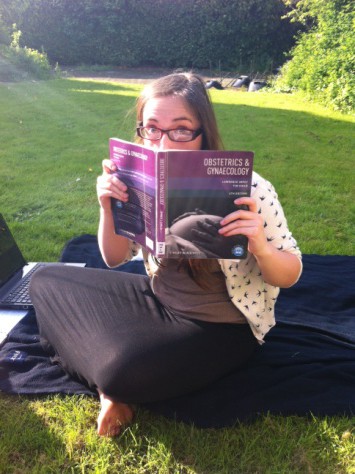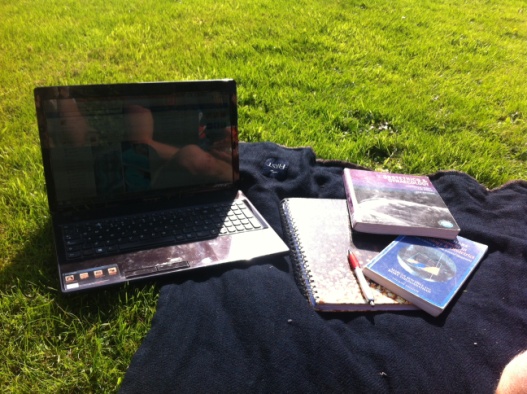May 6, 2014, by studentcontributor
Exams exams exams…
 Hi, it’s Hannah again! So no-one likes exams and I’m sure it’s at the forefront of a lot of people’s minds at the moment with GCSE, AS and A level exams coming up soon. I am also unfortunately revising at the moment for end of fourth year exams which are my last set now before finals (scarily!). People often ask on Open Days and such about the medical school exams so I thought I would touch upon them in this week’s blog. First a few general points and then I’ll break down how they work here at Nottingham.
Hi, it’s Hannah again! So no-one likes exams and I’m sure it’s at the forefront of a lot of people’s minds at the moment with GCSE, AS and A level exams coming up soon. I am also unfortunately revising at the moment for end of fourth year exams which are my last set now before finals (scarily!). People often ask on Open Days and such about the medical school exams so I thought I would touch upon them in this week’s blog. First a few general points and then I’ll break down how they work here at Nottingham.
Most people’s biggest concern before they start is that all the exams will be super difficult and really there isn’t that much of a jump between A levels and med school exams in terms of difficulty, there’s just an awful lot of stuff to remember! For example not much about anatomy is difficult but you do need to know a bit about every bone, muscle, artery, vein and nerve in the body! There’s also a worry that suddenly you’ll be expected to just learn everything on your own and sit in the library all day but there’s a lot of support available, with online resources and plenty of core teaching in lots of forms.
Pre-clinical exams
Most of these are on computers now and the majority are multiple choice however it does still vary from module to module. There are a few essays to write and a few bits of coursework but the focus is on core knowledge tested in an exam setting, twice a year (January and June). In the first two years it centres on basic medical sciences and physiology (so getting to know what’s “normal”) and developing your skills as an adult learner. This means you are told what you need to learn through set learning objectives and although most of this information is taught in lectures, you will be expected to do a bit of your own reading.
There are also a few different exams in the early years: spotters and OSCEs. The spotter is a way of testing anatomy with prosections and scans to look at and be questioned on. This is quite unusual and can be hard to get your head around but there are plenty of opportunities to practice. The OSCE format is the same across all med schools and will be a way of examining you throughout your time as a student and in your later career. These are the patient (usually role-players) exams where you are tested on your examination skills. In years 1 and 2 these are just the basic examinations (e.g listening to someone’s chest) and you are just expected to do these on healthy people.
Half way through third year you also have a viva exam where you discuss your BMedSci dissertation with two examiners.
Clinical years
 From mid third year onwards you get examined through a mix of online knowledge assessments and OSCEs. You also have to pass certain clinical competencies, like taking blood, throughout your attachments. At this point you have started to get used to all of the formats and are expected to see patients that have signs of disease to find when you examine them. These become less intimidating the more you practice them and the people who do well tend to be people that have become a part of the medical team they are in while on placement so working hard throughout the term and not just cramming for an exam is really important!
From mid third year onwards you get examined through a mix of online knowledge assessments and OSCEs. You also have to pass certain clinical competencies, like taking blood, throughout your attachments. At this point you have started to get used to all of the formats and are expected to see patients that have signs of disease to find when you examine them. These become less intimidating the more you practice them and the people who do well tend to be people that have become a part of the medical team they are in while on placement so working hard throughout the term and not just cramming for an exam is really important!
As I said before there is lots of support from lecturers, doctors on the ward, teaching fellows, nurse educators and online resources, as well as your friends and peer teachers, to help you get through the exams, so don’t let them put you off! We do have more exams than lots of other degrees but they are also very relevant to the work you’re doing every day. I still hate revision and use any excuse not to do it (like writing blogs!) but at least I’m interested in the topics I’m learning and can relate it to real people I’ve met on the wards.
Good luck in any exams you’ve got coming up, don’t forget to take a break every now and again and try not to think about results too much!

Nice article.
Having been through medical school in the UK I can testify as to how much hard work it is. Although problem solving skill are essential in medicine, time after time I still find that a lot in medicine relies on factual knowledge. The best learning method I’ve found is the active recall (flash cards) and distributed practice method (repeat testing over time) – there are all sorts of Apps and websites which can help with this eg. http://mem-note.com